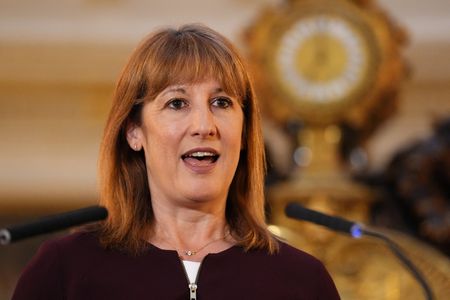LONDON (Reuters) –
British firms have reported a loss of momentum and confidence ahead of possible new tax increases in finance minister Rachel Reeves’ next budget in November, according to a survey that also showed another drop in hiring.
S&P Global’s preliminary UK Composite Purchasing Managers’ Index, covering the services and manufacturing sectors, slowed to 51.0 in September from 53.5 in August, not far above the 50.0 level that separates growth from contraction.
Economists polled by Reuters had forecast a softer fall to 53.0 in Tuesday’s survey.
The PMI’s measure of business optimism about the coming 12 months slipped to its lowest since June.
“Amid talk of further tax rises being needed in the Budget later this year, it’s not surprising to see that business expectations have worsened again in September,” Chris Williamson, chief business economist at S&P Global Market Intelligence, said.
“In the absence of an improvement in confidence, it’s unlikely that the economy will make any strong gains in the months ahead irrespective of the outlook for interest rates,” Williamson said.
Reeves is trying to chart a way between raising taxes and boosting growth in her November 26 budget.
Firms cut jobs again, reflecting “hiring freezes and the non-replacement of voluntary leavers in response to strong cost pressures and reduced workloads”.
S&P said the preliminary PMI reading for the services sector hit a two-month low of 51.9 in September, down from 54.2 in August. The smaller manufacturing PMI fell to its lowest since April at 46.2 from 47.0 in August.
Service providers reported a steep rise in output prices, which they attributed to wage pressures and efforts by suppliers to pass on higher payroll costs to consumers.
Many employers have said they are struggling to cope with the higher costs resulting from a tax increase on them in Reeves’ first budget.
However, there was a slight moderation in companies’ cost pressures this month.
Williamson said the signs of lost momentum from the PMI survey might prompt the Bank of England to take a quicker approach to cutting interest rates.
The BoE held its benchmark rate at 4% last week and it is monitoring for signs that inflation pressures are waning before it reduces borrowing costs again.
(Reporting by Suban Abdulla; Editing by Hugh Lawson)











